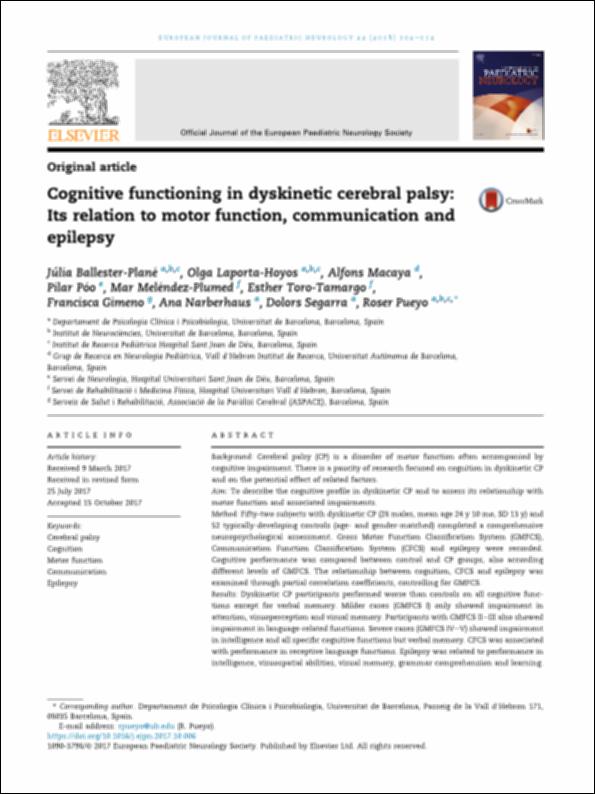Por favor, use este identificador para citar o enlazar este ítem:
http://hdl.handle.net/10637/15128Cognitive functioning in dyskinetic cerebral palsy: Its relation to motor function, communication and epilepsy
| Título : | Cognitive functioning in dyskinetic cerebral palsy: Its relation to motor function, communication and epilepsy |
| Autor : | Ballester-Plané, Júlia Laporta-Hoyos, Olga Macaya, Alfons Póo, Pilar Meléndez-Plumed, Mar Toro-Tamargo, Esther Gimeno, Francisca Narberhaus, Ana Pueyo, Roser |
| Materias: | Cerebral palsy; Cognition; Motor function; Communication; Epilepsy |
| Editorial : | Elsevier |
| Citación : | Ballester-Plane, Julia; Laporta-Hoyos, Olga; Macaya, Alfons; Poo, Pilar; Melendez-Plumed, Mar; Toro-Tamargo, Esther; Gimeno, Francisca; Narberhaus, Ana; Segarra, Dolors; Pueyo, Roser. (2018) Cognitive functioning in dyskinetic cerebral palsy: Its relation to motor function, communication and epilepsy. EUROPEAN JOURNAL OF PAEDIATRIC NEUROLOGY. 22 - 1, pp. 102 - 112. https://doi.org/10.1016/j.ejpn.2017.10.006 |
| Resumen : | Background Cerebral palsy (CP) is a disorder of motor function often accompanied by cognitive impairment. There is a paucity of research focused on cognition in dyskinetic CP and on the potential effect of related factors. Aim To describe the cognitive profile in dyskinetic CP and to assess its relationship with motor function and associated impairments. Method Fifty-two subjects with dyskinetic CP (28 males, mean age 24 y 10 mo, SD 13 y) and 52 typically-developing controls (age- and gender-matched) completed a comprehensive neuropsychological assessment. Gross Motor Function Classification System (GMFCS), Communication Function Classification System (CFCS) and epilepsy were recorded. Cognitive performance was compared between control and CP groups, also according different levels of GMFCS. The relationship between cognition, CFCS and epilepsy was examined through partial correlation coefficients, controlling for GMFCS. Results Dyskinetic CP participants performed worse than controls on all cognitive functions except for verbal memory. Milder cases (GMFCS I) only showed impairment in attention, visuoperception and visual memory. Participants with GMFCS II–III also showed impairment in language-related functions. Severe cases (GMFCS IV–V) showed impairment in intelligence and all specific cognitive functions but verbal memory. CFCS was associated with performance in receptive language functions. Epilepsy was related to performance in intelligence, visuospatial abilities, visual memory, grammar comprehension and learning. Conclusion Cognitive performance in dyskinetic CP varies with the different levels of motor impairment, with more cognitive functions impaired as motor severity increases. This study also demonstrates the relationship between communication and epilepsy and cognitive functioning, even controlling for the effect of motor severity. |
| Descripción : | Este artículo está en acceso abierto, siguiendo la política de acceso de la editorial Elsevier |
| URI : | http://hdl.handle.net/10637/15128 |
| Derechos: | http://creativecommons.org/licenses/by-nc-nd/4.0/deed.es |
| ISSN : | 1532-2130 |
| Fecha de publicación : | ene-2018 |
| Centro : | Universitat Abat Oliba CEU |
| Aparece en las colecciones: | Documents de recerca |
Los ítems de DSpace están protegidos por copyright, con todos los derechos reservados, a menos que se indique lo contrario.


